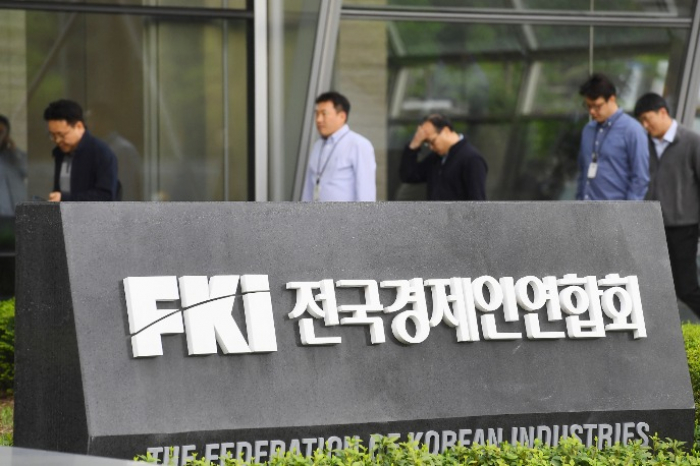Leadership & Management
Fortune 500 has just 16 Korean companies: study
Eight of them are in semiconductors; China leads the list with 136 selections
By Dec 23, 2022 (Gmt+09:00)
2
Min read
Most Read
LG Chem to sell water filter business to Glenwood PE for $692 million


KT&G eyes overseas M&A after rejecting activist fund's offer


Mirae Asset to be named Korea Post’s core real estate fund operator


StockX in merger talks with Naver’s online reseller Kream


Meritz backs half of ex-manager’s $210 mn hedge fund



Sixteen South Korean corporations are on Forbes' Global 500 list, a survey found.
Critics say the distribution of the nation's leading companies is too narrow, as the 16 are concentrated in a handful of sectors, a situation that has not changed for eight years.
An analysis of Fortune's Global 500 this year, released on Thursday by the Federation of Korean Industries (FKI) said China had the most on the list with 136 companies. The US was next with 124, followed by Japan with 47, Germany with 28, France with 25, the UK at 18 and then Korea. Thirty-three countries had at least one company on the list.
By sales, American companies led the list with $11.2 trillion, ahead of China with $11 trillion despite the latter having more companies on the list. The 16 Korean companies took in $996.2 billion, placing Korea at seventh in both the number of companies and revenue on the Global 500.
The 16 Korean companies were Samsung Electronics Co., LG Electronics Inc., SK Hynix Inc., Hanwha Corp., KB Financial Group, Samsung Life Insurance, Hyundai Motor Co., Kia Corp., Hyundai Mobis, SK Inc., Korea Electric Power Corp., GS Caltex, Posco Holdings Inc., Samsung C&T Corp., CJ Corp. and LG Chem Ltd.
The 16 represented only eight of the list's 21 sectors, with 12 of them concentrated in electronics and microchips, finance, cars and energy. No Korean companies were in future-oriented fields like aerospace and health care communications.
In contrast, the US had Fortune 500 companies in 19 sectors, China in 15, Japan and France 13 each, and Germany 11.
The FKI said there has been no changed in the number of sectors where Korean companies on the list are active since 2015, when the Global 500 began classifying companies by industry. In 2015, Korean companies occupied eight fields; the number has remained at six to eight every year since then.
"Excessive regulation on Korean companies has lowered their competitiveness in conventional industries and made it difficult to find successful companies in new industries," said Yoo Hwan-ik, head of the FKI's Industrial Research Division.
"To ddevelop companies that will represent Korea in the global market, it is necessary to ease regulations that discriminate against large corporations," he added.
Write to Jae-Fu Kim at hu@hankyung.com
More to Read
-
 Business & PoliticsSouth Korea needs to attract more foreign professionals: FKI
Business & PoliticsSouth Korea needs to attract more foreign professionals: FKIDec 08, 2022 (Gmt+09:00)
1 Min read -
 FKI calls for further easing of new CVC rules to spur investment
FKI calls for further easing of new CVC rules to spur investmentAug 19, 2020 (Gmt+09:00)
2 Min read -
 Korea’s reliance on semiconductor chips increases economic vulnerability: FKI
Korea’s reliance on semiconductor chips increases economic vulnerability: FKIAug 12, 2020 (Gmt+09:00)
3 Min read
Comment 0
LOG IN


